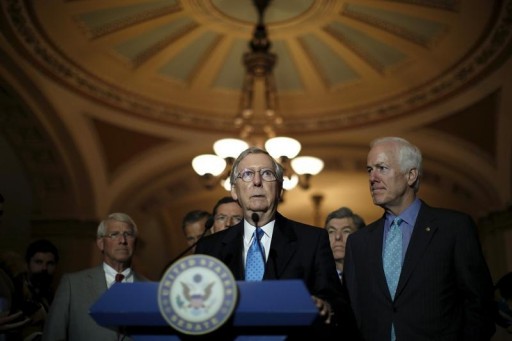
Georgetown, KY – President Barack Obama has “a great likelihood of success” in his showdown with congressional Republicans on the Iran nuclear deal, Senate Majority Leader Mitch McConnell grudgingly acknowledged on Monday.
The GOP-led Senate and House are expected to turn down the deal next month, with the Kentucky Republican calling it flawed and House Speaker John Boehner criticizing the accord. The deal with Tehran and world powers would curb Iran’s nuclear program in exchange for relief from economic sanctions.
Obama has pledged to veto a congressional resolution of disapproval. The question then becomes whether opponents of the accord can muster the votes to override the president.
Offering a preview of the struggle, McConnell talked about the difficulty in achieving an override. Obama needs 34 Senate Democrats to sustain a veto, and 20 have announced they are backing the deal. In the House, 146 Democrats are necessary to sustain a veto and 48 have expressed their support for the accord, compared to 10 opponents.
“He can win by getting one-third plus one of either house,” McConnell told a business group in his home state of Kentucky. “So he’s still got a great likelihood of success.”
Even if Obama prevails, however, the deal can be reviewed by the next president, McConnell said.
McConnell publicly conceding that Obama has the advantage reflects what Democrats and Republicans have been saying privately. His comments, however, come as groups on both sides of the issue spend millions of dollars on ads they hope will sway lawmakers next month.
McConnell, R-Ky., said he would be surprised if any Senate Republican supports the deal.
“The campaign of the president to get it approved will be entirely among Democrats, probably Democrats in very safe Democratic seats whose only fear of re-election would probably be getting a primary,” he said.
The one notable defection is Sen. Chuck Schumer of New York, the No. 3 Senate Democrat and the party’s leader-in-waiting. McConnell said Schumer’s opposition was helpful.
“I hope we can defeat it, but the procedure is obviously stacked in the president’s favor,” McConnell told reporters afterward. “We’ll see.”
Arizona Sen. Jeff Flake, the lone Republican senator who was considering support for the nuclear deal, recently announced plans to vote no.
“I was pleased that he finally reached the same conclusion the rest of us did, that it was not in America’s best interests to support it,” McConnell said.
McConnell said he hoped to have a “respectful, uplifting debate” when the deal reaches the Senate floor.
“What I’ve asked my colleagues to do is to sit at their desks, listen to each other and treat the consideration of this agreement with the respect that it deserves,” he said. “This is a major, major foreign policy decision.”
Still, McConnell denounced the accord as a “very flawed deal” on several fronts.
“It leaves the Iranians with threshold nuclear capability,” he said. “It has no impact on all of their other activities. They are the biggest sponsor of terrorism in the world today. The inspections are flawed.”
Sen. Bob Corker, R-Tenn., the chairman of the Senate Foreign Relations Committee, said in an op-ed in The Washington Post that Congress should reject the deal and send it back to the president.
As reported by Vos Iz Neias
